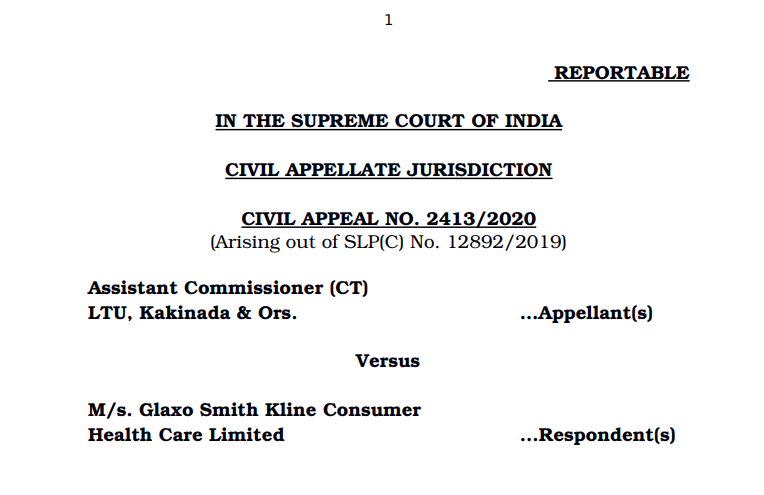Condonation of delay denied: M/s. Glaxo Smith Kline Consumer Health Care Limited
Table of Contents
Case Covered:
Assistant Commissioner (CT) LTU, Kakinada & Ors.
Versus
M/s. Glaxo Smith Kline Consumer Health Care Limited
Read the full text of the case here.
Facts of the case:
The moot question in this appeal emanating from the judgment and order dated 19.11.2018 in Writ Petition No. 39418/2018 passed by the High Court of Judicature at Hyderabad for the State of Telangana and the State of Andhra Pradesh1 is: whether the High Court in the exercise of its writ jurisdiction under Article 226 of the Constitution of India ought to entertain a challenge to the assessment order on the sole ground that the statutory remedy of appeal against that order stood foreclosed by the law of limitation?
The respondent is a registered dealer on the rolls of Assistant Commissioner of Commercial Taxes, Large Tax Payer Unit at Kakinada Division under the provisions of Andhra Pradesh Value Added Tax Act, 2005 and the Central Sales Tax Act, 1956 and is engaged in the business of manufacturing and sale of Horlicks, Boost, Biscuits, Ghee, Ayurvedic Medicines, etc. The Assistant Commissioner had called upon the respondent to produce books of accounts for the assessment year 2013-14 for finalization of assessment under the 1956 Act. The authorized representative of the respondent produced declaration in Form “F” in support of its claim that certain transactions are interState transfers. The information and declaration furnished by the respondent were duly verified and after giving personal hearing to the respondent, final assessment order came to be passed by the Assistant Commissioner on 21.6.2017, raising demand of Rs.76,73,197/ (Rupees seventy-six lakhs seventy-three thousand one hundred ninety-seven only) against the turnover of Rs.3,44,15,240/ (Rupees three crores forty-four lakhs fifteen thousand two hundred forty only) on the finding that the respondent had failed to submit Form “F” to the tune of the turnover reported in the Central Sales Tax (CST) return. This assessment order was duly served on the respondent on 22.6.2017. The respondent did not file an appeal against this assessment order within the statutory period. Instead, the amount equivalent to 12.5% of the demand was deposited on 12.9.2017. The respondent then filed an application under Rule 60 of the Andhra Pradesh Value Added Tax Rules, 2005, highlighting the error made in raising the demand based on incorrect turnover reported by the respondent. This application was filed only on 8.5.2018, which came to be rejected by the Assistant Commissioner vide order dated 11.5.2018. Aggrieved by the decision dated 11.5.2018, the respondent filed an appeal before the Appellate Deputy Commissioner of Commercial Taxes, Vijayawada on 28.5.2018, which came to be rejected on 17.8.2018. It is only thereafter, the respondentassessee was advised to file an appeal before the Appellate Deputy Commissioner on 24.9.2018 against the assessment order dated 21.6.2017. In the meantime, another assessment order came to be passed on 31.3.2018 in relation to the Audit taken up for the tax period from 1.4.2013 to 31.3.2017. We are not concerned with the said order in the present appeal.
Observations of the court:
Suffice it to observe that this decision is on the facts of that case and cannot be cited as a precedent in support of an argument that the High Court is free to entertain the writ petition assailing the assessment order even if filed beyond the statutory period of maximum 60 days in filing an appeal. The remedy of appeal is a creature of statute. If the appeal is presented by the assessee beyond the extended statutory limitation period of 60 days in terms of Section 31 of the 2005 Act and is, therefore, not entertained, it is incomprehensible as to how it would become a case of violation of fundamental right, much less statutory or legal right as such.
The judgement of the court:
Taking any view of the matter, therefore, the High Court ought not to have entertained the subject writ petition filed by the respondent herein. The same deserved to be rejected at the threshold.
Accordingly, we allow this appeal and set aside the impugned judgment and order passed by the High Court and dismiss the writ petition. There shall be no order as to costs. Pending interlocutory applications, if any, shall stand disposed of.
Download the copy:
 ConsultEase Administrator
ConsultEase Administrator
Consultant
Faridabad, India
As a Consultease Administrator, I'm responsible for the smooth administration of our portal. Reach out to me in case you need help.








